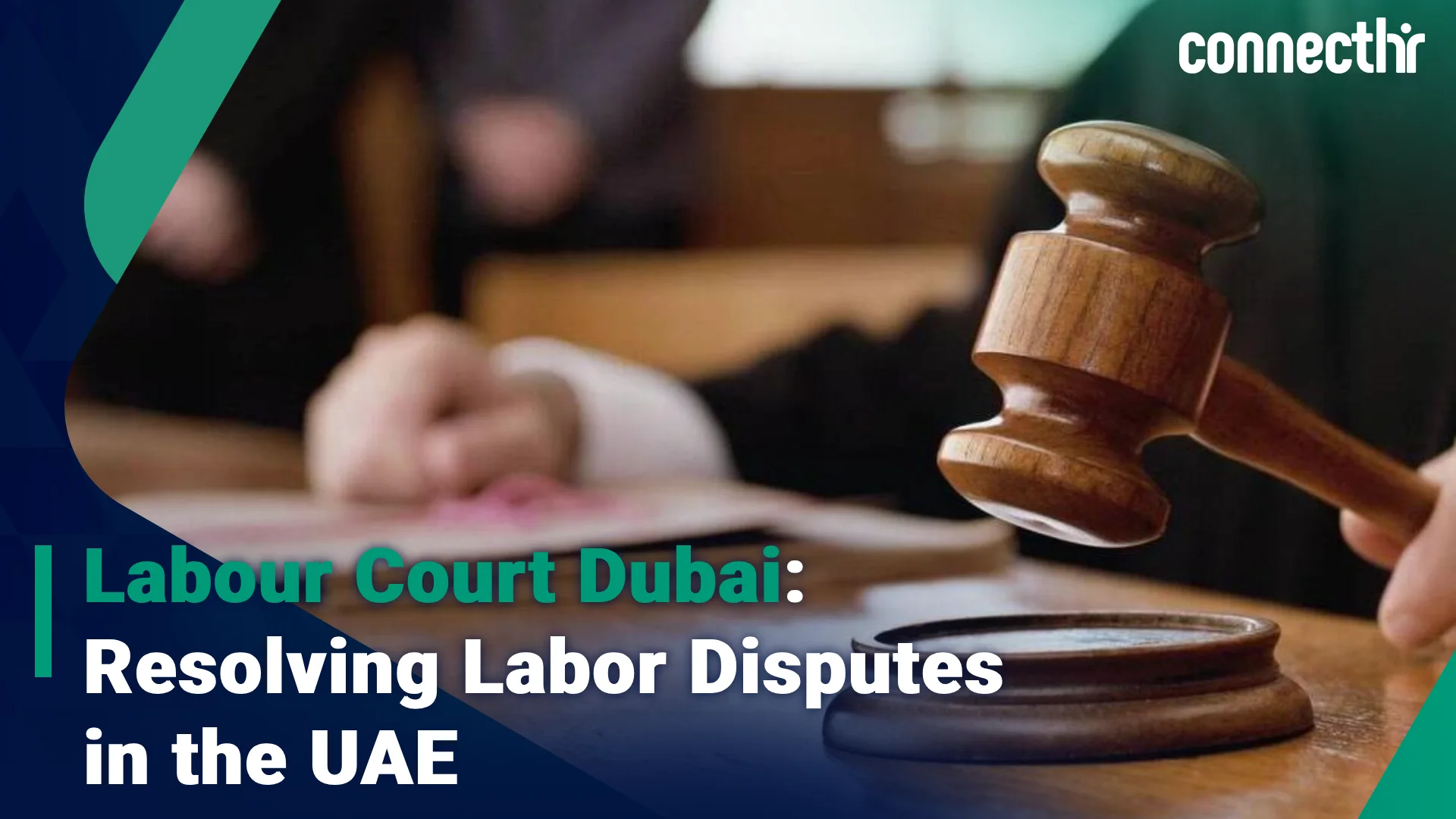In the dynamic landscape of HR and payroll management, Al Wasl Tower stands as a beacon of innovation and efficiency. So, you need to know the Labour Court Dubai! Especially, this post will interest you if you have already seen others like “Main HR Companies in Dubai” or “HR Courses in Dubai“.
In this article, discover the transformative power of Al Wasl Tower in redefining HR and payroll operations, fostering a seamless blend of technology and infrastructure.
What is the Labour Court Dubai?
 The Dubai Labor Tribunal plays a vital role in mediating and resolving labor disputes, offering a critical avenue for individuals and businesses seeking justice in the complex web of employment relations. So, this section delves into the intricate mechanisms that define the court’s operation.
The Dubai Labor Tribunal plays a vital role in mediating and resolving labor disputes, offering a critical avenue for individuals and businesses seeking justice in the complex web of employment relations. So, this section delves into the intricate mechanisms that define the court’s operation.
What is the Role and Functioning of Labour Court Dubai?
The Labour Court Dubai serves as a legal forum where employers and employees present their cases, seeking resolutions for a spectrum of workplace conflicts. To clarify, its primary function involves adjudicating disputes, ensuring equitable outcomes.
Additionally, the court facilitates conciliation, allowing parties to explore amicable settlements. In other words, this dual role of adjudication and conciliation underscores the multifaceted nature of the court’s functioning.
What is the Significance in the Legal System of Dubai?
Firstly, in the broader legal landscape of Dubai, the Labour Court holds unparalleled significance. It acts as a cornerstone in upholding the emirate’s commitment to fair labor practices and harmonious employer-employee relationships.
As a result, the court’s rulings set precedents, influencing the interpretation and application of labor laws in Dubai. Its decisions resonate beyond individual cases, contributing to the evolving framework of employment regulations.
Furthermore, the court’s role extends to maintaining legal order and fostering a conducive environment for businesses. Also, its significance is not merely confined to dispute resolution but radiates throughout Dubai’s legal system, shaping the contours of employment jurisprudence.
Dubai Labor Tribunal: Key Component of Labour Dispute Resolution
Delving into the intricate structure of labor dispute resolution, the Dubai Labor Tribunal emerges as a linchpin in fostering fair and just resolutions. So, understanding its role and Labor Jurisdiction in Dubai is pivotal for those navigating the complexities of employment conflicts.
What is the Role and Jurisdiction of Dubai Labor Tribunal?
The Dubai Labor Tribunal plays a multifaceted role as a quasi-judicial entity, functioning within the broader legal framework governing labor relations. Its primary role involves the adjudication and resolving labor disputes in Dubai, ensuring a transparent and impartial legal process.
Additionally, the tribunal assumes a proactive stance in facilitating conciliation between conflicting parties. This dual role underscores its commitment to not only mete out justice but also encourage amicable resolutions.
Scope of Labour Disputes Addressed
The tribunal’s jurisdiction extends across a spectrum of labor disputes, encompassing issues related to employment contracts, termination, wage disputes, and other employment-related grievances. Its comprehensive scope reflects a commitment to providing a holistic platform for dispute resolution.
What are the Types of Cases Heard by Dubai Labor Tribunal?
Navigating the diverse landscape of employment conflicts, the Dubai Labor Tribunal stands as a beacon for resolving a myriad of cases. Its broad jurisdiction accommodates various labor-related disputes, ensuring comprehensive coverage within the realm of Labour Court Dubai.
- Contractual Disputes. Employment contracts form the bedrock of employer-employee relationships. So, the tribunal addresses disputes arising from contract interpretation, breach, or disagreements over contractual terms.
- Unfair Termination Claims. Employees facing abrupt termination or those deeming their dismissal as unjust can file claims with the tribunal. It serves as a forum to evaluate the fairness and legality of termination actions.
- Wage and Compensation Disputes. Issues related to salaries, benefits, allowances, or overtime pay fall under the purview of the tribunal. This includes disputes over non-payment, delayed payments, or discrepancies in compensation.
- Disciplinary Actions. Disagreements arising from disciplinary actions, such as warnings, suspensions, or other punitive measures, can be brought before the tribunal for assessment and resolution.
- Non-Compliance with Labor Laws in the UAE. Employers failing to adhere to Labour Laws in the UAE may face legal action. Therefore, the tribunal addresses cases related to non-compliance with regulations governing working hours, leave entitlements, and other statutory provisions.
- Workplace Harassment or Discrimination. Cases involving workplace harassment, discrimination, or unequal treatment can find resolution within the tribunal. It assesses the merits of such claims and strives to ensure a fair and inclusive work environment.
- Occupational Health and Safety Disputes. Above all, matters related to workplace safety, inadequate safety measures, or disputes arising from occupational health concerns can be adjudicated by the tribunal.
Understanding the expansive array of cases heard by the Dubai Labor Tribunal is crucial for individuals and businesses navigating the intricate web of employment disputes.
Labour Procedures in Dubai: Navigating Legal Resolution
Embarking on the journey of labor dispute resolution within the ambit of Dubai Labor Tribunal involves a structured legal process. For this reason, understanding the intricacies of Labor Procedures in Dubai is pivotal for both employees seeking justice and employers navigating the legal landscape.
What are the Legal Process in Labour Dispute Resolution?
So, the process unfolds in a series of steps, ensuring fairness and adherence to the established legal framework. Also, each stage is designed to facilitate a comprehensive resolution, promoting equity in the realm of Labour Court Dubai.
What are the Steps to File a Case in Labour Court Dubai?
You need to know:
- Lodging a Complaint. Initiating the process involves filing a formal complaint with the tribunal. Also, this document outlines the details of the dispute, providing essential information about the parties involved, the nature of the conflict, and the desired resolution.
- Preliminary Conciliation. Above all, subsequent to filing the complaint, the tribunal encourages parties to engage in preliminary conciliation. So, this step aims to resolve the matter amicably without the need for protracted legal proceedings.
- Mediation and Settlement Attempts. Mediation sessions may be scheduled, facilitating discussions between the parties with the aim of reaching a mutually agreeable settlement. The tribunal actively supports alternative dispute resolution mechanisms.
Procedural Guidelines for Employers and Employees
Navigating the legal intricacies demands a clear understanding of procedural guidelines, ensuring a smooth and effective resolution process.
- Documentary Evidence. Both parties are required to submit relevant documentary evidence supporting their claims. This may include employment contracts, communication records, and any other pertinent documents.
- Legal Representation. Parties may opt to engage legal representation during proceedings. Understanding the nuances of Labor Laws in the UAE, legal professionals play a vital role in presenting cases and ensuring adherence to legal standards.
- Witness Testimonies. Additionaly, the tribunal may call upon witnesses to provide testimonies. Above all, tis step contributes to the evidentiary process, aiding in a thorough examination of the facts.
- Adjudication and Ruling. Following a comprehensive review of the presented evidence, the tribunal issues a ruling. As a result, this final decision is binding, providing closure to the dispute and outlining any required actions for resolution.
Labour Laws in the UAE: Impact on Dispute Resolution
Understanding the intricate relationship between Labour Laws in the UAE and the resolution of employment disputes is paramount, particularly when navigating the legal corridors of Labour Court Dubai. In this section, we delve into the profound impact these laws have on the process of dispute resolution.
Overview of UAE Labour Legislation
The foundation of labor dispute resolution is rooted in the comprehensive legislation of the UAE. Encompassing a wide array of regulations, the UAE Labour Legislation establishes the framework within which employment relationships are governed and disputes are addressed. So, this legal landscape plays a pivotal role in shaping the dynamics of the workplace.
What is the Relevance of Labour Laws in Labour Disputes?
Here is the information about the Labour Court Dubai:
- Ensuring Fair Employment Practices. The UAE’s labor laws are designed to uphold fairness in employment relationships. This includes regulations related to working hours, wages, and conditions, contributing to the prevention of disputes arising from unfair labor practices.
- Employee Rights and Protections. Labour laws explicitly outline the rights and protections afforded to employees. Understanding these rights forms the cornerstone of dispute resolution, as it provides a clear standard against which disputes can be evaluated.
- Contractual Agreements. So, the legal framework guides the formation and execution of employment contracts. Clarity in contractual agreements minimizes ambiguities and serves as a reference point in resolving disputes related to employment terms and conditions.
Adherence to Legal Framework in Dubai
More information about the Labour Court Dubai:
- Legal Compliance in Dispute Resolution. Therefore, parties engaged in disputes within Labour Court Dubai are required to adhere strictly to the legal framework established by UAE labor laws. This adherence ensures a standardized and just resolution process.
- Guidance for Employers and Employees. Also, labour laws serve as a guide for both employers and employees, offering clarity on their respective rights and responsibilities. This clarity is instrumental in navigating disputes effectively.
- Legal Recourse and Enforcement. For this reason, the legal framework provides avenues for seeking recourse and enforcement of rights. This ensures that parties involved in disputes can rely on established legal channels for resolution.
Resolving Labour Disputes in Dubai: Process and Outcomes
Efficiently navigating the intricacies of resolving labor disputes in Dubai demands a keen understanding of the process, encompassing various outcomes and rulings. The esteemed Labour Court Dubai plays a pivotal role in determining these resolutions, with far-reaching implications for both employers and employees.
What are the Outcomes and Rulings in Labour Disputes?
- Mediation and Conciliation. Certainly, a significant number of disputes initiate with mediation or conciliation, providing a platform for parties to explore amicable solutions. Therefore, this initial step, outside the formal court setting, can circumvent prolonged legal proceedings.
- Diverse Court Decisions. Additionaly, Labour Court Dubai issues decisions encompassing a spectrum of possibilities. Moreover, rulings may favor the employer, the employee, or propose a compromise, with each decision tailored to the unique circumstances of the case.
What are the Possible Resolutions by the Labour Court?
- Compensation Awards. Addressing financial aspects, the court may certainly order compensation payments based on the nature of the dispute. Therefore, this could involve remuneration for salary arrears, end-of-service benefits, or damages incurred.
- Contractual Revisions. In instances of contractual disputes, the court may recommend or enforce revisions to employment contracts. This approach ensures compliance with UAE labor laws, fostering fairness and clarity in employment relationships.
- Decisions on Termination Disputes. A critical facet involves the court’s scrutiny of termination disputes. It may certainly determine the lawfulness or unlawfulness of termination, potentially ordering reinstatement or compensatory measures for unjust dismissal.
What are the Implications of Court Rulings in Labour Cases?
The implications are here:
- Establishing Legal Precedence. The rulings by Labour Court Dubai significantly contribute to establishing legal precedence. They serve as guiding principles for future cases, shaping interpretations and applications of labor laws in Dubai.
- Enforcement Mechanisms. The decisions emanating from the court hold substantial weight, with stringent enforcement mechanisms in place. Certainly, non-compliance with court rulings can result in legal repercussions for the party failing to adhere.
- Influence on Employment Relations. So, the outcomes of labor disputes undoubtedly influence future employment relations within organizations. Employers may revisit policies for compliance, while employees become more cognizant of their rights and potential legal recourse.
Labour Jurisdiction in Dubai: Legal Boundaries and Applications
 Navigating the legal landscape of labor jurisdiction in Dubai involves understanding the intricate legal boundaries and applications that define the jurisdiction of the esteemed Labour Court Dubai. This section delves into the scope, limitations, case suitability, and legal constraints inherent in the labor jurisdiction framework.
Navigating the legal landscape of labor jurisdiction in Dubai involves understanding the intricate legal boundaries and applications that define the jurisdiction of the esteemed Labour Court Dubai. This section delves into the scope, limitations, case suitability, and legal constraints inherent in the labor jurisdiction framework.
Scope and Limitations of Labour Jurisdiction
For example:
- Scope of Jurisdiction. The Labour Court Dubai has a broad scope of jurisdiction, covering an array of employment-related disputes. This encompasses matters such as wrongful termination, unpaid salaries, contractual disputes, and violations of labor laws.
- Limitations on Jurisdiction. However, the court’s jurisdiction is not without limitations. Certain matters, such as criminal offenses unrelated to employment, fall outside the purview of the Labour Court Dubai. It is crucial to comprehend these limitations when considering legal actions.
Case Suitability for Labour Court Dubai
For instance:
- Nature of Employment Disputes. The suitability of a case for Labour Court Dubai hinges on the nature of the employment dispute. Certainly, disputes arising from employment relationships, contractual disagreements, and breaches of labor laws are prime candidates for adjudication.
- Complexity of Cases. The court is well-equipped to handle a spectrum of cases, from straightforward salary disputes to complex contractual disagreements. The suitability criterion considers the complexity of the legal issues involved and the need for specialized adjudication.
Understanding Legal Constraints in Labour Disputes
Labour disputes in Dubai necessitate strict adherence to the legal framework, emphasizing compliance with established labor laws. This adherence forms the cornerstone for presenting a case within the Labour Court Dubai. For example:
- Procedural Guidelines. Additionally, understanding the procedural guidelines is imperative. Legal constraints often revolve around procedural nuances, requiring parties involved to adhere meticulously to filing Labor Procedures in Dubai, evidentiary requirements, and court timelines.
- Role of Legal Representation. Consequently, the involvement of legal representatives plays a crucial role in navigating legal constraints. Certainly, legal professionals well-versed in labor laws and the workings of Labour Court Dubai can guide parties through potential pitfalls.
Conclusion: Significance of Labour Court Dubai in UAE
The role of the Labour Court Dubai in the UAE is of paramount importance, serving as a cornerstone in the resolution of labor disputes. Certainly, its significance extends beyond being a legal forum, encompassing a transformative impact on the broader spectrum of labor relations within the Emirates.
What are the Recommendations for Navigating Labour Disputes?
The recommendations are:
- Legal Expertise. Navigating the intricacies of the legal landscape, including Dubai Labor Tribunal procedures and UAE labor laws, necessitates the engagement of legal experts. Seeking professional advice is recommended for a comprehensive understanding of rights and obligations.
- Preventive Measures. Employers and employees are advised to implement preventive measures to mitigate potential disputes. So, this involves robust adherence to labor laws, transparent communication, and well-drafted employment contracts to preclude ambiguities.
Resolving Disputes Amicably and Efficiently
For example:
- Mediation and Conciliation. An efficient approach involves exploring mediation and conciliation avenues before resorting to the legal process. Labour Court Dubai encourages amicable resolutions, promoting dialogue and negotiated settlements.
- Timely Action. Timeliness is critical. Most importantly, in the event of a dispute, prompt action ensures that the matter is addressed swiftly, minimizing disruptions to work environments and allowing for quicker resolution.
What are the Future Implications and Compliance After Court Proceedings?
The future implications are:
- Post-Court Compliance. After court proceedings, compliance with the court’s rulings is imperative. Adhering to the decisions of Labour Court Dubai is crucial for maintaining legal standing and upholding the integrity of the labor dispute resolution process.
- Reevaluation of Policies. So, future implications involve a reevaluation of internal policies. Employers are encouraged to assess their HR practices, ensuring alignment with court rulings and evolving labor laws to prevent recurring disputes.
 In conclusion, you know all the information about the Labour Court Dubai. Visit ConnectHR for cutting-edge HR solutions tailored to meet your organizational needs. Call us!
In conclusion, you know all the information about the Labour Court Dubai. Visit ConnectHR for cutting-edge HR solutions tailored to meet your organizational needs. Call us!





